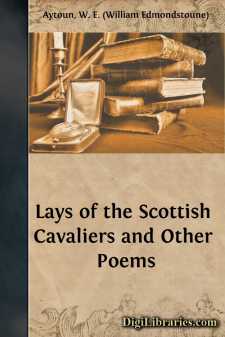Categories
- Antiques & Collectibles 13
- Architecture 36
- Art 48
- Bibles 22
- Biography & Autobiography 813
- Body, Mind & Spirit 142
- Business & Economics 28
- Children's Books 13
- Children's Fiction 10
- Computers 4
- Cooking 94
- Crafts & Hobbies 4
- Drama 346
- Education 46
- Family & Relationships 57
- Fiction 11828
- Games 19
- Gardening 17
- Health & Fitness 34
- History 1377
- House & Home 1
- Humor 147
- Juvenile Fiction 1873
- Juvenile Nonfiction 202
- Language Arts & Disciplines 88
- Law 16
- Literary Collections 686
- Literary Criticism 179
- Mathematics 13
- Medical 41
- Music 40
- Nature 179
- Non-Classifiable 1768
- Performing Arts 7
- Periodicals 1453
- Philosophy 64
- Photography 2
- Poetry 896
- Political Science 203
- Psychology 42
- Reference 154
- Religion 513
- Science 126
- Self-Help 84
- Social Science 81
- Sports & Recreation 34
- Study Aids 3
- Technology & Engineering 59
- Transportation 23
- Travel 463
- True Crime 29
W. E. (William Edmondstoune) Aytoun
William Edmondstoune Aytoun (1813–1865) was a Scottish poet, humorist, and professor of rhetoric and belles-lettres at the University of Edinburgh. He is best known for his humorous ballads and his collaboration with Theodore Martin on the satirical collection "The Bon Gaultier Ballads" (1845). Aytoun also wrote "Lays of the Scottish Cavaliers" (1849), a collection of poems glorifying Scotland’s history and heroes. In addition to his literary work, Aytoun was politically active, advocating for Conservative causes, and contributed to "Blackwood's Magazine."
Author's Books:
Sort by:
PREFACE. A further edition of this book—the sixteenth—having been called for, I have been asked by the publishers to furnish a preface to it. For prefaces I have no love. Books should speak for themselves. Prefaces can scarcely be otherwise than egotistic, and one would not willingly add to the too numerous illustrations of this tendency with which the literature of the day abounds. I would...
more...
LAYS OF THE SCOTTISH CAVALIERS The great battle of Flodden was fought upon the 9th of September, 1513. The defeat of the Scottish army, mainly owing to the fantastic ideas of chivalry entertained by James IV., and his refusal to avail himself of the natural advantages of his position, was by far the most disastrous of any recounted in the history of the northern wars. The whole strength of the kingdom,...
more...
THE COURTING OF T'NOWHEAD'S BELL, By J. M. Barrie For two years it had been notorious in the square that Sam'l Dickie was thinking of courting T'nowhead's Bell, and that if Little Sanders Elshioner (which is the Thrums pronunciation of Alexander Alexander) went in for her, he might prove a formidable rival. Sam'l was a weaver in the tenements, and Sanders a coal-carter,...
more...




